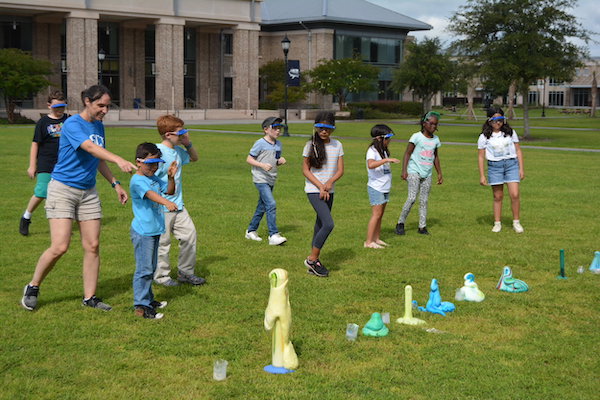"Mad Scientists" Camp helps youngsters explore their environment
Graced with the sea, marshes and state-of-the-art laboratories at the University of South Carolina Beaufort, the Lowcountry is a great place to learn about science — and it’s never too early to start. Campers from the Beaufort-Jasper YMCA spent last week [July 12-16] immersed in nature, learning from USCB faculty who are experts in the fields of ecology, biochemistry, zoology and more.
The motto of the day camp was: “What Is Our World Made Of? Let’s Go Explore It!” Guided by members of the University of South Carolina’s Biology department, boys and girls ages 7-11 used hydrogen peroxide to make “elephant toothpaste,” cultivated bacteria, tested water and observed animals commonly found in coastal environments.
The campers were quick to make connections between organisms they observed in nature and human life.
“A sea squirt was the inspiration for water guns!” said Aiden Richards, 9.
A highlight of the week came when Jim and Teri Pohorsky of Beaufort Kayak Tours took the group paddling on the Beaufort River, where they saw bottlenose dolphins and sea birds including oyster catchers and ospreys. After the excursion, USCB biologists Dr. Kathryn Madden and Dr. Mercer Brugler led the kids making plankton nets out of water bottles and then gathering water samples and filtering them.
The baby alligators were another standout moment. Dr. Madden and Tony Mills, host of television series Coastal Kingdom, brought native animals of the Lowcountry to “meet and greet” the campers, who didn’t think twice about asking to touch them.
Inspiration for the camp came two years ago when USCB administrators invited teachers, principals and guidance counselors from local schools to the Bluffton campus, said Dr. Jena Chojnowski, Assistant Professor of Developmental and Molecular Biology at USCB and director of the science camp.
“They said that kids need to know what college is like. Most have never been on a campus and don’t know any college professors,” she said. “I decided right then that we could bring our community to us in a camp and I would make it happen.”
She reached out to department chair Dr. Joseph Staton and her colleagues, who responded favorably by offering to plan and lead activities. Then Dr. Chojnowski contacted the Beaufort-Jasper YMCA, where her proposal was received enthusiastically.
“They really enjoyed it,” said Shirley Faulcon, the YMCA’s lead specialty counselor,
who accompanied the campers to USCB. “They gave a lot of good answers to very scientific
questions.”
The week was all about taking a closer look: campers used microscopes to observe swimming tadpoles, dissected starfish and examined owl pellets (the undigested parts of a bird's food, including hair or bones, which are regurgitated). Many conversations centered around cause and effect, such as when the group discussed how pesticides, fertilizers and “dog poop” affect water quality.
The camp staff hopes some of the week’s experiences will become lasting memories that encourage the students. Dr. Chojnowski said her favorite moment came Tuesday during a recap of the day. As the kids were lining up to leave USCB, Sophia Cazares, 9, said “I learned that girls can be scientists.”
Because the biologists would love to see the campers return to the University as students, Dr. Chojnowski said Sophia’s remark made her day.
 Participants in USCB’s “Mad Scientists” day camp used hydrogen peroxide to make “elephant
toothpaste.” Dr. Jena Chojnowski was the camp’s director.
Participants in USCB’s “Mad Scientists” day camp used hydrogen peroxide to make “elephant
toothpaste.” Dr. Jena Chojnowski was the camp’s director.